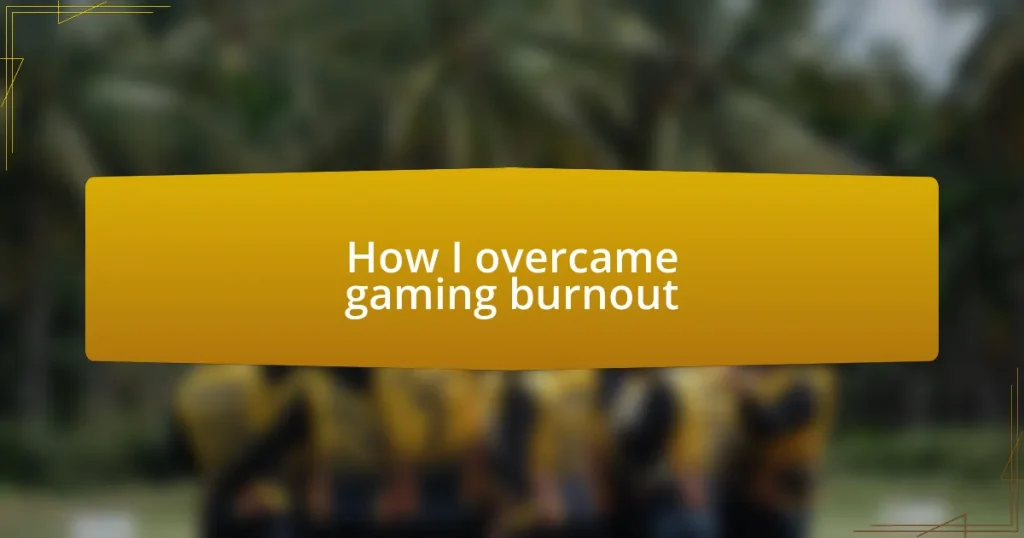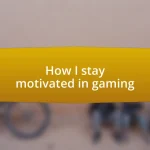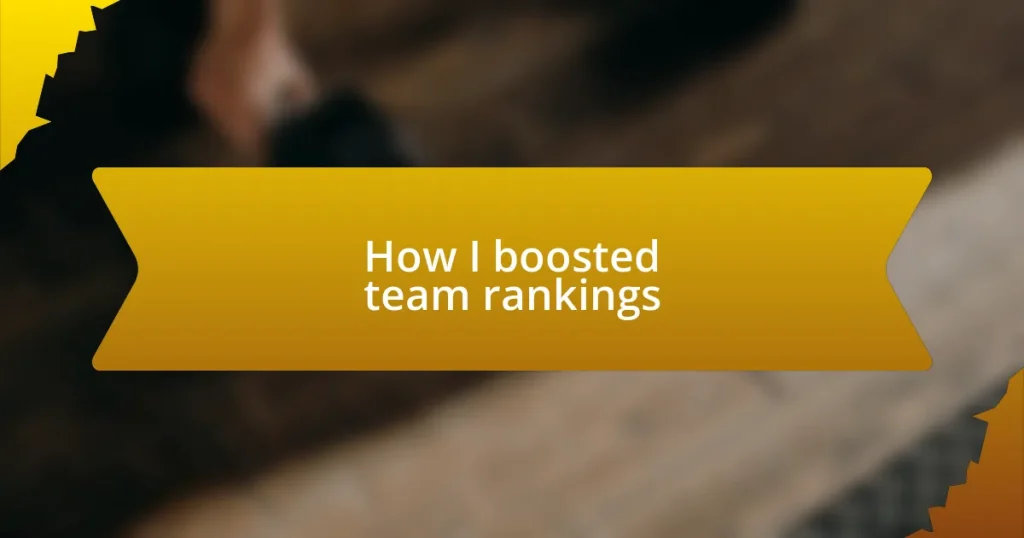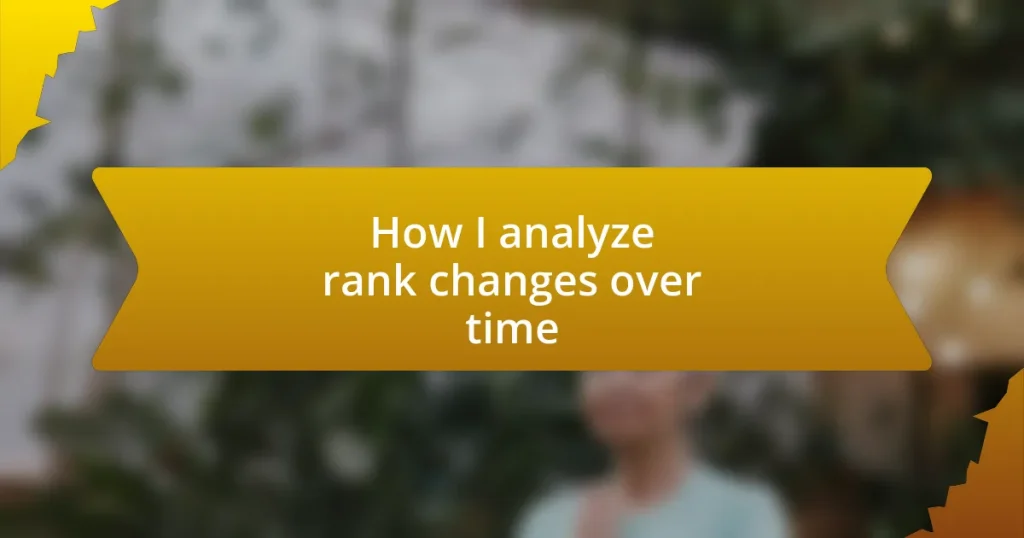Key takeaways:
- Gaming burnout is an emotional state resulting from forced interactions and pressure to keep up, leading to indifference towards games once loved.
- Common signs of burnout include loss of interest, playing out of obligation, and irritability during gaming sessions.
- Establishing boundaries, scheduling gaming sessions, and diversifying experiences can help maintain a healthy relationship with gaming.
- Engaging with gaming communities and exploring alternative activities can rejuvenate passion and provide balance in gaming experiences.
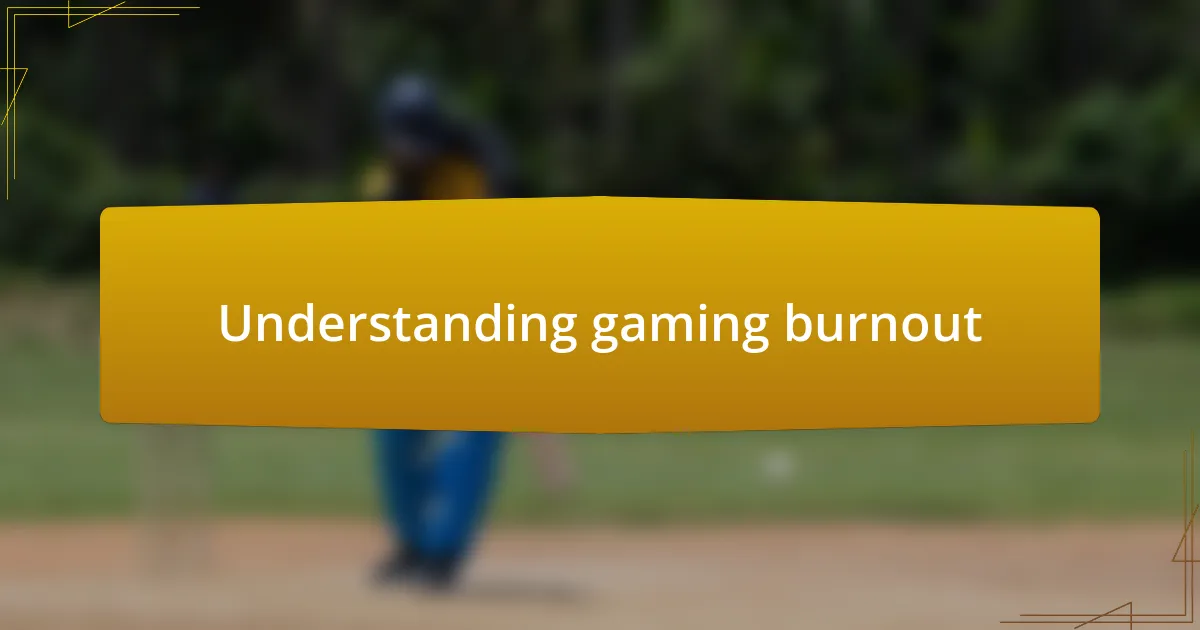
Understanding gaming burnout
Gaming burnout is more than just feeling tired from too much screen time; it’s a complex emotional state that can drain your enthusiasm for a hobby you once loved. I’ll never forget the moment I realized I wasn’t just tired but genuinely indifferent to my favorite games. It was disheartening to find myself staring at a game I used to be passionate about, feeling nothing but fatigue instead of excitement—isn’t it strange how something that once brought endless joy can suddenly become a source of exhaustion?
As I navigated through this phase, I began to understand that gaming burnout often stems from forcing interactions in a space that should feel enjoyable and fulfilling. When I caught myself grinding through levels just to keep up with friends or fulfill self-imposed milestones, the thrill faded rapidly. I asked myself, “Why am I playing?” and realized that gaming should never feel like an obligation. It should be a retreat, a sanctuary rather than another item on my to-do list.
Additionally, I noticed that the pressure to keep up with trends and achievements played a detrimental role in my burnout. The gaming community’s competitive nature can create an environment where you feel like you have to constantly prove yourself. Reflecting on this aspect made me question my priorities. Did I really want to chase validation, or was my ultimate goal to enjoy the escapism that gaming offers? This introspection was key in redefining my relationship with gaming, allowing me to step back and reconnect with the joy that initially drew me to it.
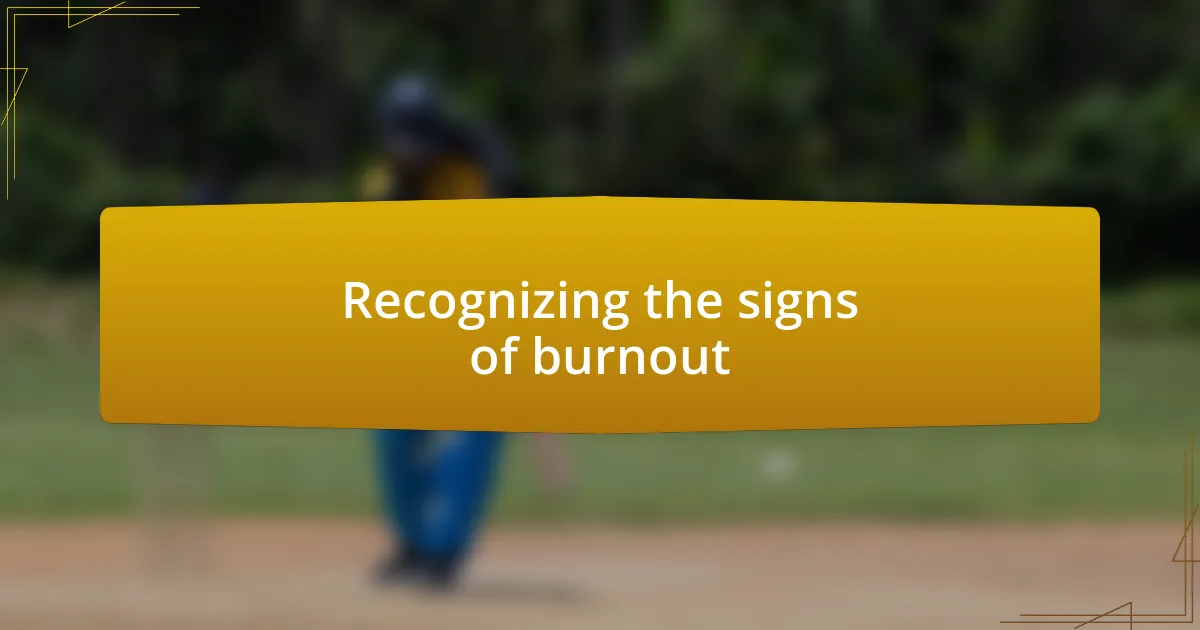
Recognizing the signs of burnout
Recognizing the signs of burnout can be a subtle process. I remember when my gaming sessions began to feel more like a chore than a joy. It wasn’t just the long hours; it was the lack of excitement, the disconnection from the very worlds I once loved. If you find yourself experiencing similar feelings, it might be time to pause and reflect on your gaming habits.
Here are some common signs to look out for:
- Loss of interest in games you used to enjoy
- Constantly feeling tired or drained after gaming
- Playing out of obligation rather than for enjoyment
- Increased irritability or frustration during gaming sessions
- Skipping social interactions with friends or gaming communities
These indicators can serve as a wake-up call. I learned that being aware of these warning signs is essential to regain that thrill and connection with gaming, which is ultimately what makes it worthwhile.

Strategies for proactive recovery
One effective strategy for proactive recovery is to establish a structured gaming schedule. I found that setting aside specific times for gaming helped me regain balance in my life. Instead of binge-playing, I began to enjoy my sessions more because they felt intentional rather than excessive.
Another crucial tactic is diversifying your gaming experiences. For a while, I was stuck in a loop of playing the same genre, which contributed to my burnout. By exploring different types of games—such as puzzle games when I felt overwhelmed or narrative-rich titles when I sought immersion—I rekindled my passion for gaming, giving myself the opportunity to discover new favorites.
Lastly, engaging with gaming communities can reignite your enthusiasm. I remember joining forums dedicated to game discussions and sharing tips, which reinvigorated my interest. The social aspect reminded me that gaming is not just about the screen but also about the connections we foster with others who share our passion.
| Strategy | Description |
|---|---|
| Structured Schedule | Setting specific times for gaming to maintain balance and enjoyment. |
| Diversification | Exploring different genres and types of games to reignite passion. |
| Community Engagement | Joining online forums and discussions to connect and share experiences. |

Setting healthy gaming boundaries
Setting boundaries around gaming is essential for maintaining a healthy relationship with it. I remember a time when I found myself playing late into the night, sacrificing sleep and social interactions. To counteract this habit, I started to set a firm cut-off time for gaming sessions, which not only allowed me to recharge but also improved my overall mood and productivity.
It can be tempting to dive into gaming whenever you have free time. However, I discovered that integrating breaks into my gaming routine was a game changer. Taking short breaks not only refreshed my mind but also increased my enjoyment of the game, as I returned with a clearer perspective. Have you ever felt overwhelmed just from gaming too much in one sitting? I know that feeling all too well, and these intentional pauses have since become a vital part of my gaming experience.
Another boundary that worked well for me was limiting the types of games I played during tough weeks. When I was consumed by work stress, I found solace in lighter, more casual games rather than my usual intense titles. This simple adjustment provided me with an escape without adding to my stress. Setting healthy gaming boundaries isn’t just about restricting time; it’s about creating an environment where gaming can be a joyful part of life.
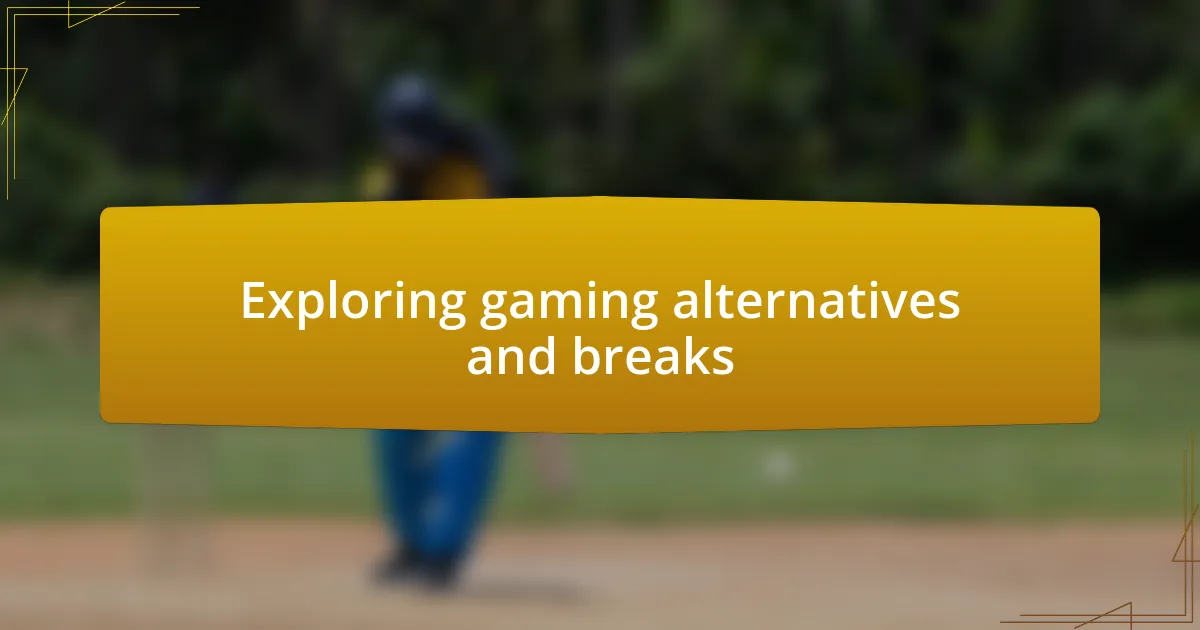
Exploring gaming alternatives and breaks
Finding alternatives to gaming has been crucial in my journey away from burnout. When I noticed the joy beginning to fade, I explored activities like reading or painting. I can still recall the soothing feeling of mixing colors on a canvas, which became a refreshing escape. Have you ever considered trying something completely different to recharge? Sometimes, stepping away from the screen opens up new avenues of creativity and joy.
Taking breaks from gaming doesn’t just mean pausing the controller; it involves engaging with real-world experiences. I spent weekends hiking in nature instead of grinding in a game. Those moments in the fresh air helped me reconnect with myself and find balance. It’s interesting how disconnecting from digital worlds can be a pathway to personal growth. What activities bring you peace away from gaming?
I started scheduling gaming-free days, and it felt liberating. During these days, I focused on other hobbies and even caught up on shows I had neglected. Adopting this rhythm rejuvenated my enthusiasm for gaming when I returned. Have you found that stepping back has made your gaming sessions more enjoyable? This practice helps break the cycle of burnout and can help redefine your relationship with gaming.
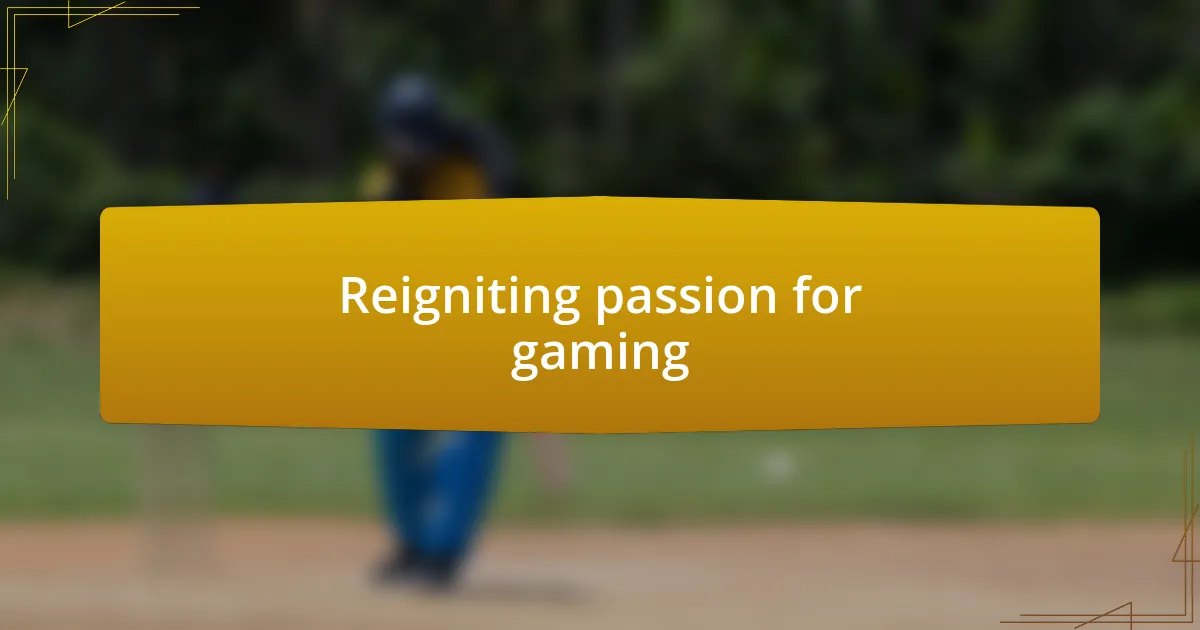
Reigniting passion for gaming
Reigniting my passion for gaming was all about reconnecting with the aspects I loved most. I decided to revisit some of my favorite old games, ones that held nostalgic memories. As I loaded up my trusty game from childhood, I could feel excitement bubbling up—those pixelated graphics reminded me of lazy afternoons spent immersed in another world. Have you ever revisited a game and felt that spark reignite?
To spice things up, I started exploring cooperative play with friends. The laughter and camaraderie brought a fresh perspective to gaming sessions. I fondly remember one evening where we spent hours navigating through a co-op puzzle game, teasing each other and sharing strategies. The joy of shared experiences transformed gaming from a solitary endeavor into a vibrant social activity. Don’t you think gaming is often more fun when it’s shared with others?
I also experimented with game genres I had previously overlooked, like indie titles that offer unique narratives or art styles. Discovering a game with a compelling story can completely shift your perspective and renew your interest. I stumbled upon a beautifully crafted indie game about self-discovery, and it struck a chord with me. It reminded me that gaming could be an emotional journey, not just a pastime. What unique experiences have you uncovered in unexpected games?
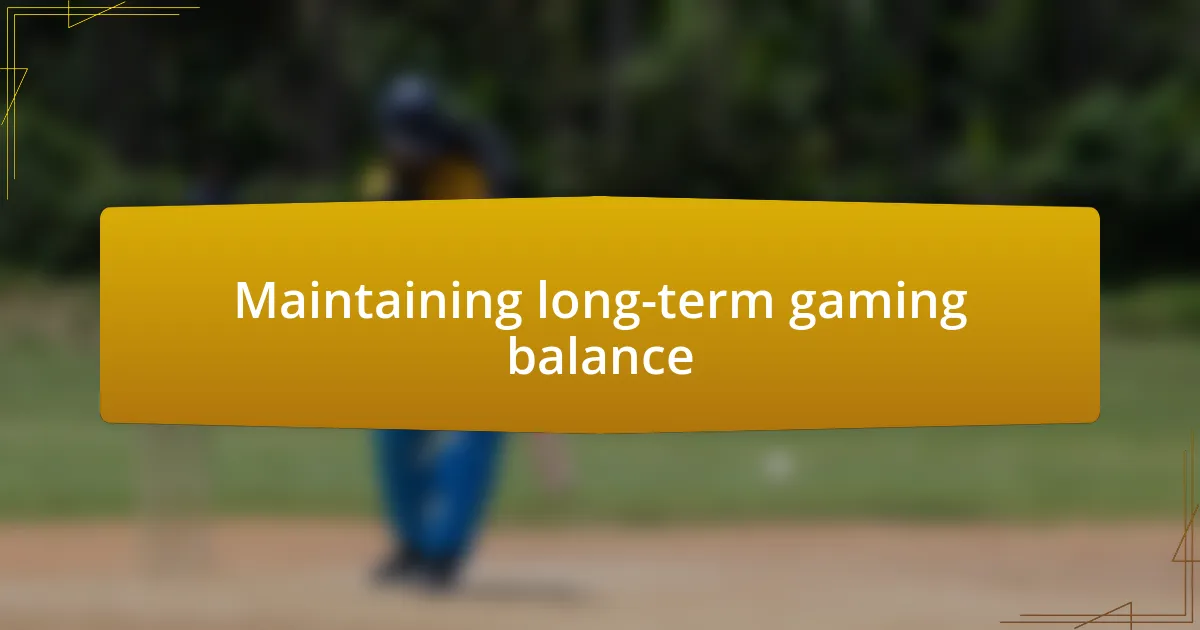
Maintaining long-term gaming balance
Maintaining a long-term gaming balance is crucial to ensure that this beloved hobby remains a source of joy rather than stress. I’ve learned that setting boundaries is vital. For instance, I dedicated specific days to gaming and others for hobbies or outdoor activities. By doing this, I discovered how much I enjoyed my gaming sessions without feeling overwhelmed by them.
Sometimes, I make a conscious effort to take breaks during longer gaming marathons. I recall one day when I lost track of time and ended up playing for six hours straight. It wasn’t until I felt drained that I realized I had missed out on other activities I love. Now, I set timers to remind myself to step away, grab a snack, or even take a quick walk. Have you ever felt the satisfaction of returning to a game after a refreshing break?
Lastly, I try to engage with the gaming community outside of just playing. Joining forums or attending local meetups has not only enriched my gaming experience but also provided a fresh perspective on balancing my time. It’s fascinating how sharing experiences can motivate you to approach gaming differently. Have you connected with fellow gamers to share your insights?










